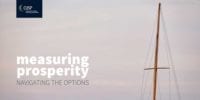
Empirical Insights about Sustainable Welfare and Eco-social Policies
Sub-theme at the 2021 ISEE/ESEE/Degrowth conference in Manchester, 6 July 2021, 3.30pm
This session at the 2021 International Degrowth and ISEE Joint Conference will present empirical contributions to the question of how we can design sustainable welfare policies that take an integrated approach to problems of social justice and ecological sustainability.
The concept of ‘Sustainable Welfare’ deals with the satisfaction of human needs within planetary limits, at local, national and global levels, with an intergenerational perspective. It envisions potentially far-reaching transformations of current socio-economic institutions and arrangements in rich countries. This includes the construction of alternative livelihoods through a range of eco-social policies that seek to reconcile issues of social justice with environmental protection. The two issues are fundamentally inter-connected, with the causes and consequences of environmental damages being unequally distributed between the poor and the rich. Further, green policies such as carbon taxes can, if not carefully designed, result in a disproportionate distribution of burdens on the poor.
There is a growing interest in policies for a just transition, as for example is visible in the European Commission’s proposal for a European Green Deal. However, policy responses so far have mainly focused on separate solutions, with welfare state regulation and redistribution used to reduce social inequalities on the one hand, and environmental laws and taxes introduced to stimulate ecologically sustainable behaviour on the other hand. Yet, these isolated approaches miss the dual fact that the current growth-dependent welfare practices and institutions are not ecologically sustainable, and that environmental politics are often not socially just.
In response to these challenges, Sustainable Welfare aims to reconcile social policy with environmental protection, and to forge an integrated eco-social policy strategy that enables ‘a good life’ for all, without exceeding ecological limits.
In this academic paper session, we will discuss empirical studies looking at eco-social policies, sustainable welfare, the links and interconnections between ecological and social attitudes, values and mentalities, and other related topics. Contributions can be comparative or in-depths studies, and can employ qualitative, quantitative or mixed methods approaches.
Format
This session is part of a sub-theme on ‘Sustainable Welfare beyond Growth’. Please also consider the two other sessions, one of which deals with theoretical perspectives on sustainable welfare and the other with the discussion of concrete eco-social policy proposals.
Contact
The session is led by CUSP researcher Christine Corlet Walker and Uni Jena colleague Martin Fritz. Abstracts of no more than 250 words are welcome by March 6, 2020. Please send them to: Christine Corlet Walker, c.corlet@surrey.ac.uk and Martin Fritz, martin.fritz@uni-jena.de. Please note that due to the COVID-19 crisis, the conference was rescheduled for 2021. for further details, please see the conference website.



